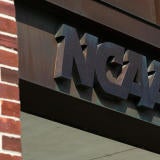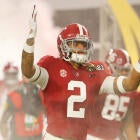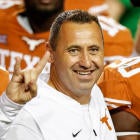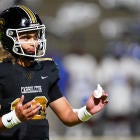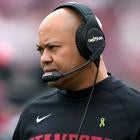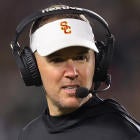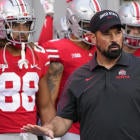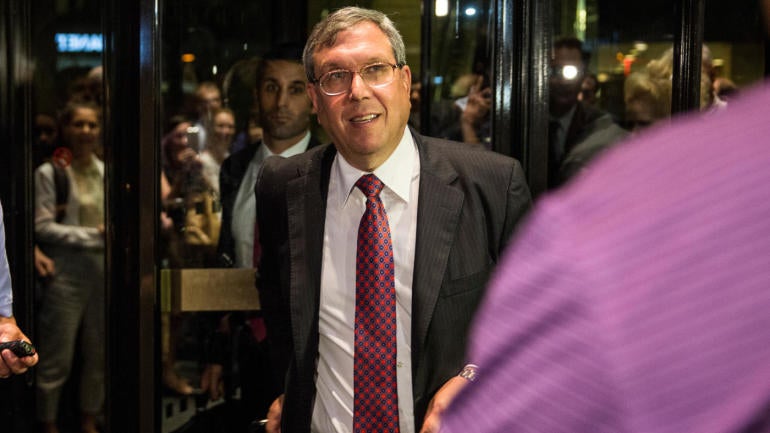
Now would be a good time for Jeffrey Kessler to call it quits. The 69-year-old father of two and grandfather of four has hit the ultimate legal walk-off. By force of his will, experience and smarts he has taken down an entire industry – college sports. Or at least reshaped it.
Through his efforts, the NCAA lies in shambles after last week's announcement of a settlement in House v. NCAA (bundled with other cases). College athletes are about to receive a windfall the size of Nicaragua. All because Jeffrey Kessler is one big pain in the butt.
Don't worry, the nation's most influential sports lawyer has heard the term before.
"As long as my clients don't think I'm a pain in the butt – I feel that's my audience," Kessler told CBS Sports. "Frankly, if all the adversaries thought I was wonderful I was probably not doing my job."
We know this because as lead attorney in the House case, Kessler won the big one. The NCAA and FBS conferences are on the hook for $2.8 billion in damages. Going forward, the power conference schools may end up paying $30 million per year for the next 10 years in revenue sharing and to fully fund scholarships.
Athletes past and present will get paid. We just don't know how much. Like a Hitchcock thriller, the suspense is killing us. It has already laid low the NCAA.
"He's a powerhouse," said former Clemson cornerback Martin Jenkins, a lead plaintiff in a previous Kessler case that led to this moment, "an absolute powerhouse. I think [this] will just add to his legacy."
The effort took decades, thousands of billable hours and resulted in a nice nine-figure fee for Kessler and his partner in House, Steve Berman. Kessler brushes off his individual impact in representing scores of athletes but the lingering perception is he won the big one – because he usually doesn't lose.
"He interrupts judges all the time," Berman said. "They would say, 'Mr. Kessler you have to let me finish.' He'd say, 'Oh, sorry your honor.' I don't think he's deliberately rude. He's just so impassioned with whatever he's talking about he gets carried away.
"He was on the other side of an antitrust case in San Francisco. I couldn't believe the defendants had this loud New Yorker with a heavy accent in the Northern District of California. I thought, 'Wow, they picked a guy as foreign to this jurisdiction as possible.' I don't think [the judges] liked him. Over time they began to like him because he's a good guy."
Any history of college sports written right now might as well be ghostwritten by Kessler. The entire enterprise is being rewritten before our eyes pretty much because of Kessler.
"It revolutionized college sports," Kessler said, when asked of the legacy of his antitrust court victories. "I know some people think in the wrong way [but] whether it's good or bad, it's a revolution."
Yes, now would be a good time for Kessler to call it quits but he's not close. For starters, the co-executive chairman at power law firm Winston & Strawn would like to see that settlement agreement through.
"My life is fine," Kessler said. "I don't plan on going anywhere."
There's too much to do. Kessler came of age in Brooklyn in the 1960s, the son of a real estate developer (dad) and homemaker (mom). As a teenager he was inspired in the 1960s by political activism, the civil rights movement and Vietnam War protests. His heroes were Muhammad Ali, Olympian John Carlos and Kareem Abdul-Jabbar.
With his dogged style, Kessler has done just about everything that can be done in sports law. If you don't know about him as a sports fan, you at least have experienced his work. He helped create the NBA, NFL and NHL players associations. Kessler has also cost those leagues millions of dollars in litigation.
Those leagues are also better for it today. Because of Kessler and his peers, the success of any league is defined by revenue and labor peace. The landmark Freeman McNeil case against the NFL led by Kessler established free agency in that league in 1991.
"It's hard to explain that to people who are less than 45 years old," Kessler said. "All they know their professional lives, and as fans, is free agency. They couldn't imagine it didn't exist, but it did not."
Given the implications of House, it appears college athletes are as close to organizing as any time in history. The NCAA and school administrators who continue to doggedly fight against a pay-for-play model may have already lost. They just don't know it. Dartmouth basketball players have unionized. National Labor Relations Board complaints in California involving the Pac-12, USC and NCAA argue that players should be considered employees.
"There are lots of people drinking at the trough here," Kessler said. "It's time for the athletes to not be so thirsty."
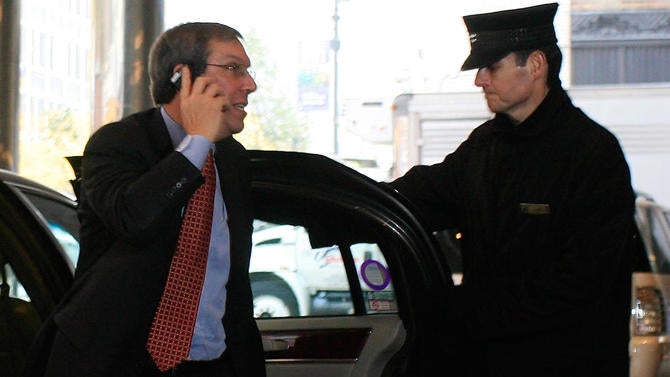
By the time Kessler got to this spot, he had already represented sprinter Oscar Pistorius, the double amputee, in his successful push to run in the London Olympics. He took the complicated case of female sprinter Castor Semenya whose gender was questioned. Kessler repped Michael Vick in a roster bonus dispute.
As the NFLPA took shape in the early 1990s, the New York Times reported former Bengals quarterback Boomer Esiason challenged Kessler to a fight. He worked on the 1976 case involving Oscar Robertson which led to NBA free agency.
In the court of public opinion, sometimes Kessler couldn't win. In representing former tailback Curtis Martin in an arbitration case, the Boston papers accused him of being a homer as Martin went from the Patriots to the Jets. Kessler represented Bill Belichick in his move from the Jets to the Patriots. The New York papers called him a traitor.
"I grew up in New York a sports fan of a number of New York teams," he said. "I rarely want to identify them."
Tom Brady relied on Kessler during "Deflategate." Kessler won equal pay for the U.S. women's national soccer team compared to the men's national team.
Underpinning Kessler's college quest is the Sherman Antitrust Act of 1890. It regulated big business by making it illegal to restrain trade or form a monopoly. The law has reigned in powerful corporations and given leverage to the powerless.
In 2014, activist Ramogi Huma sought out Kessler at the Super Bowl intending to take on the entire NCAA. Huma had already recruited Jenkins to be the lead plaintiff in what became the landmark Jenkins vs. NCAA case.
Jenkins was motivated to take on the system. He was injured his senior year. In the downtime he created a slickly produced hype video "We Too Deep" that resonates to this day.
He never saw a dime from it.
"That was the first initial inspiration that I got," Jenkins told CBS Sports. "One of the main things was how restricted I felt as a college athlete and having other talents. I ended up making a music video that the stadium adopted and the crowd chanted on third down. I wrote it, I engineered it. At the time I was not able to monetize the video, when I tried to sell my own shirts they had a problem with that."
Jenkins' case was eventually folded in with Alston v. NCAA, the case that changed everything. The NCAA somehow made the decision to take a case regarding $6,000 in educational benefits denied athletes to the Supreme Court. It was the first case involving NCAA rules before the high court in 37 years. The NCAA not only lost, the association famously got repudiated by Justice Brett Kavanaugh.
A Supreme Court stacked by a Republican administration traditionally unfriendly to labor made one of the most labor-friendly decisions in history.
"Until the Supreme Court decision they [NCAA] had been winning," Berman said. "Their big mistake was petitioning the Supreme Court."
Kessler and Berman were down the road toward becoming the Lennon/McCartney of the player compensation push.
"We met not in a friendly way," Berman recalled. "I filed the Alston case. He filed basically a copycat case in New Jersey. (Jenkins) He was very insistent that he knew better than I and the case belonged in New Jersey. I thought it would be a disaster in New Jersey … I told Jeffrey to buzz off."
The pair of Wonder (Legal) Twins eventually decided to work together. Alston was filed in the more plaintiff-friendly Northern District of California.
"I think our working together and friendship coalesced during the trial," Berman recalled. "Jeffrey is a lot of New Yorker. He gesticulates a lot with his hands. He asks the same question over and over again. I'm more of a rifle-shot, soft-spoken person. I think the combination of the two of us, different styles and personalities, was a good match for the judge. We became like brothers."
The Alston decision forced the NCAA's hand. Days later in June 2021, the association had no choice but to allow name, image and likeness. House had already been filed in 2020, seeking a portion of TV revenue.
"We filed House and – boom – the doors opened," Berman said.
Class certification granted to athletes in 2023 meant if the NCAA went to trial and lost it would owe more than $4 billion. A settlement was inevitable. Kessler knew it. A legal legend gathered more hosannas.
Questions remain. Kessler still wonders why the NCAA took Alston all the way to the Supreme Court. By that point perhaps all the justices had grown up in an era where they had heard the NCAA's thin arguments.
"Even if they were advised to consider change they couldn't change because there were so many different economic interests and forces," Kessler said of the NCAA. "There were so many people wedded to the system … that the easiest thing to do politically inside the NCAA was nothing."
The association hung on for 40 years to dicta – a legal pronouncement with no binding value – made in the NCAA v. Board of Regents of the University of Oklahoma case in 1984. That case set the stage for everything you see today. The Supreme Court ruled the NCAA was in violation of antitrust laws by limiting the number of football TV appearances a college could have.
Back then Justice John Paul Stevens said the NCAA plays a critical role in maintaining "a revered tradition of amateurism in college sports". That observation basically sustained the NCAA in court for years.
"It was [a] few sentences," Kessler said. "The NCAA took it and ran with it. The Supreme Court in Alston said [whatever] that language meant in 1984, that's not the law today.' "
Legal strategies folded like bad kites. The NCAA argued in court for years that if players were paid, fan interest would fall and attendance would decline. Since NIL debuted, attendance has increased in consecutive years for the first time since 2008. Last season was one of the highest rated seasons on TV of all time.
"This has been an old story by people controlling sports forever," Kessler said. "When I was in my battles to get free agency, the NFL owners and NBA owners – the baseball owners before them – would say free agency would destroy sports and fans would all leave.
"The NCAA said if athletes were to get compensated … it would destroy the sport and fans would leave. You saw what happened with that."
The House settlement changes the game but it doesn't end it. Preliminary approval of the settlement could come as soon as early July. But players will still be able to sue. Schools can still be sued over what are expected to Title IX issues stemming from the settlement going forward.
"This is not resolving every legal issue they face but it does resolve the antitrust piece that I think has been the most difficult issue for the NCAA over the past 10 years," Kessler said.
With plenty of potential cases still out there, why retire now? A pain in the butt can linger.






